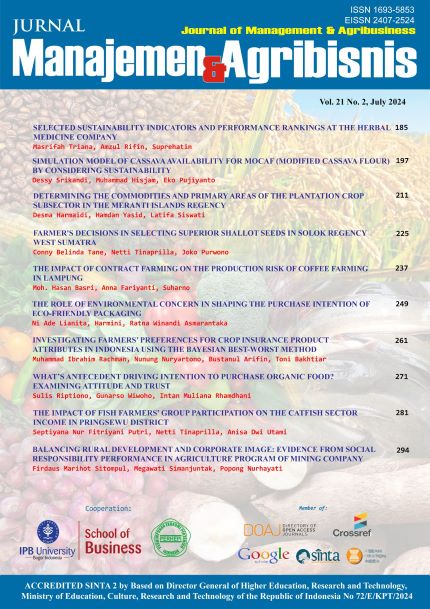Farmer's Decisions in Selecting Superior Shallot Seeds in Solok Regency West Sumatra
Abstract
Background: Shallots are a commodity that is exceptionally strategic and economical regarding farming profits. One way that farmers can increase production results is by adopting technology, such as using superior seeds.
Purpose: This research aims to describe the implementation of the SOP for SS Sakato red onion farming, identify factors that influence farmers using superior SS Sakato seeds, and analyze differences in performance between shallot farmers who use SS Sakato seeds and Non SS Sakato seeds.
Design/methodology/approach: The methods used are qualitative and quantitative analysis, logit regression analysis, and propensity score matching (PSM) analysis.
Findings/Result: The results show that the SOP adoption rate for shallots is 82%, with the highest SOP adoption being plant maintenance and the lowest SOP adoption rate determining when to plant. Factors significantly influencing farmers' decisions to use superior SS Sakato seeds in Sungai Nanam are farmer education, farmer income, access to production facilities, agricultural extension, land area, and seed resistance to pests and diseases. The use of superior SS Sakato seeds significantly positively impacts shallot production and farmer profit in shallot farming. The use of superior SS Sakato seeds can increase the income of shallot farmers even though the costs of farming are higher. The use of superior seeds should be able to reduce the costs that farmers have to pay, but in this study, the costs incurred by farmers remained high.
Conclusion: Increasing the productivity of shallots can be achieved by using quality seeds, using shallot varieties that are highly productive, adaptive, and resistant to pests and diseases, and improving cultivation techniques according to SOP. Farmers who use superior SS Sakato seeds should comply with the Standard Operating Procedure (SOP) to maximize shallot production. With an emphasis on increasing production, there should be support for farmers from seed breeding institutions to innovate in order to be able to provide superior seeds, support from technology-producing institutions, and support from extension services both from the government and the private sector.
Originality/value (State of the art): This study describes that the use of superior seeds will impact the production and productivity of shallots, costs incurred by farmers, and farmer profits. Technology is an essential factor in influencing the production function; utilizing technology will have implications for increasing efficiency. Superior seeds are a technology that can have a long-term impact.
Keywords: binary logit regression, propensity score matching (PSM), shallots, standard operating procedures (SOP), superior seeds
Authors
Authors who publish with this journal agree to the following terms:
- Authors retain copyright and grant the journal right of first publication with the work simultaneously licensed under a Creative Commons Attribution License that allows others to share the work with an acknowledgement of the work's authorship and initial publication in this journal.
- Authors are able to enter into separate, additional contractual arrangements for the non-exclusive distribution of the journal's published version of the work (e.g., post it to an institutional repository or publish it in a book), with an acknowledgement of its initial publication in this journal.
- Authors are permitted and encouraged to post their work online (e.g., in institutional repositories or on their website) prior to and during the submission process, as it can lead to productive exchanges, as well as earlier and greater citation of published work (See The Effect of Open Access).

